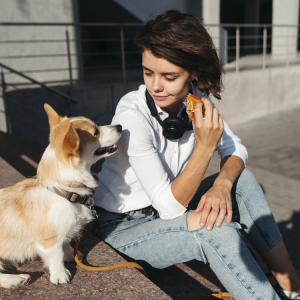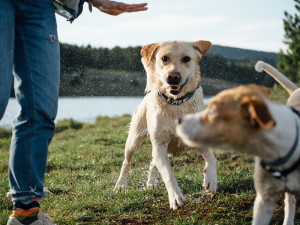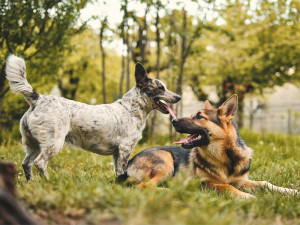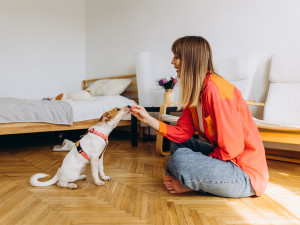Do Dogs Follow Bad Advice — Or Ignore It?
It turns out, dogs know a useless instruction when they hear it.
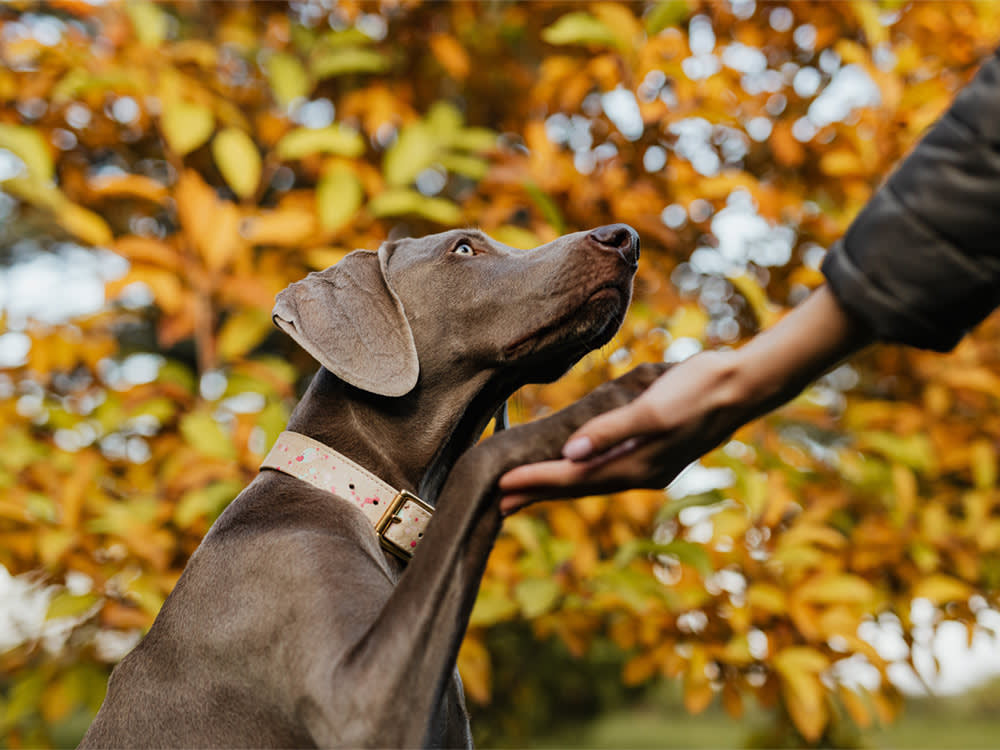
Share Article
Do you feel like your dog is ignoring you? Well, maybe that’s because you’re giving them some bad advice. At least that’s what a group of Yale researchers propose. They suggestopens in new tab that, as much as dogs like to follow our lead, dogs are free-thinkers, and they’ll ignore lousy tips that don’t serve their best interests. But there are a few holes in their argument. So, let’s look into how they arrived at this claim, which isn’t necessarily supported by the data.
The Bad-Advice Experiment
Researchers were looking to explore something called “overimitation” in dogs. In humans, children will overimitate when they perform all the steps they have been shown, even when some of them are unnecessary. This uncritical copying of the behavior they observe may allow kids to minimize the amount of trial-and-error learning they must do.
In this study, scientists investigated whether dogs (and dingoes) would imitate the way people showed them how to get food out of a puzzle box, even when there was an easier way to do it. Only one step was required to reach the food, and that was lifting the lid to a box. As part of the experiment, humans added an extra, unnecessary action to the process by pulling a lever that did nothing and then lifting the lid of the box.
Both the dogs and the dingoes quickly learned to skip the step with the useless lever and just open the box to get to the treat inside. In other words, it looked like they ignored the useless instructions from the humans. The experimenters consider this evidence that both species learned that pulling the lever was an unnecessary step for opening the box, even though they saw humans doing it.

Getting to the Real Question
So, the data set shows that both dogs and dingoes found that the lever was irrelevant. But here’s the kicker: This study does not find any evidence that dogs imitated the humans at all. Observing the humans pull the lever did not make any difference to them — the dogs were doing it completely on their own.
How do we know? In addition to the bad-advice experiment, there were also a series of box-opening trials (with a different set of animals) in which dogs and dingoes were given a puzzle box, and they still didn’t use the lever — even without observing a human opening it. The authors write that “dogs were equally likely to use the irrelevant lever,” regardless of whether they witnessed a demonstration or not.
They point out that there was no evidence that dogs were more likely to copy the humans’ actions than the dingoes were, but what’s just as important is that there was no evidence that the dogs were copying humans at all.
While it would be easy to come to the conclusion that dogs ignore bad advice from humans, this study doesn’t prove it. They would first need to show that dogs copy any human behavior, then test whether dogs copy irrelevant human behavior. There has been (and continues to be) extreme skepticism about dogs and this sort of imitation.
Dingoes vs. Dogs
There was one interesting conclusion from this study, though it has nothing to do with imitation, social learning, or human influence on dogs’ actions. Evidence from this study, as well as previous research, indicates that dingoes solve problems more quickly and with greater success than dogs.
In a third experiment, researchers offered dogs and dingoes a different puzzle box, where pulling the lever was an essential step in opening this particular puzzle box. Both dogs and dingoes did pull the lever in order to access the treat inside. Dingoes were more likely than dogs to pull the lever only when it was relevant, unlike dogs, who pulled it quite often, even when it was not an essential part of the box-opening task.

Karen B. London, PhD, CAAB, CPDT-KA
Karen B. London is a certified applied animal behaviorist (CAAB) and certified professional dog trainer (CPDT) who specializes in working with dogs with serious behavioral issues, including aggression. She has written for a variety of magazines including The Bark, Clean Run, and the APDT Chronicle of the Dog, and has published in scientific journals including Behavioral Ecology and Sociobiology, Ethology, Ecology, and Evolution, the Journal of Insect Behavior, and Insectes Sociaux. She is the author of seven books about dog training and canine behavior, including the forthcoming My Dog's Mystery Adventure: And Other Stories From a Canine Behaviorist and Dog Trainer.
Related articles
![Two dogs acting rowdy at the lake while a person tries to calm them down]()
My Dog Is Misbehaving. What Should I Do?
Don’t blame the dog — instead, figure out how to help them succeed.
![Dog barking]()
How to Stop Your Dog From Barking
The top five reasons dogs bark—and how to get them to relax a bit.
![curly haired dog waiting in a window for their owner]()
How Do Dogs Know That You Are Coming Home?
Your dog’s keen sense of smell isn’t the only clue.
![two smart dogs, a german shepherd and a collie mix breed, sitting in the grass]()
Your Dog is Smarter Than You Think
Dogs have the ability to understand much more complex things than you give them credit for.
![profile portrait of grumpy a ginger dog, inside on a golden retro velvet armchair]()
Your Grumpy Dog Is Very Smart—Science Says So
This study found that cranky pups are actually very fast social learners.
Is Your Dog a People Pleaser?
Yes — and no. Here’s why positive-reinforcement training matters.
